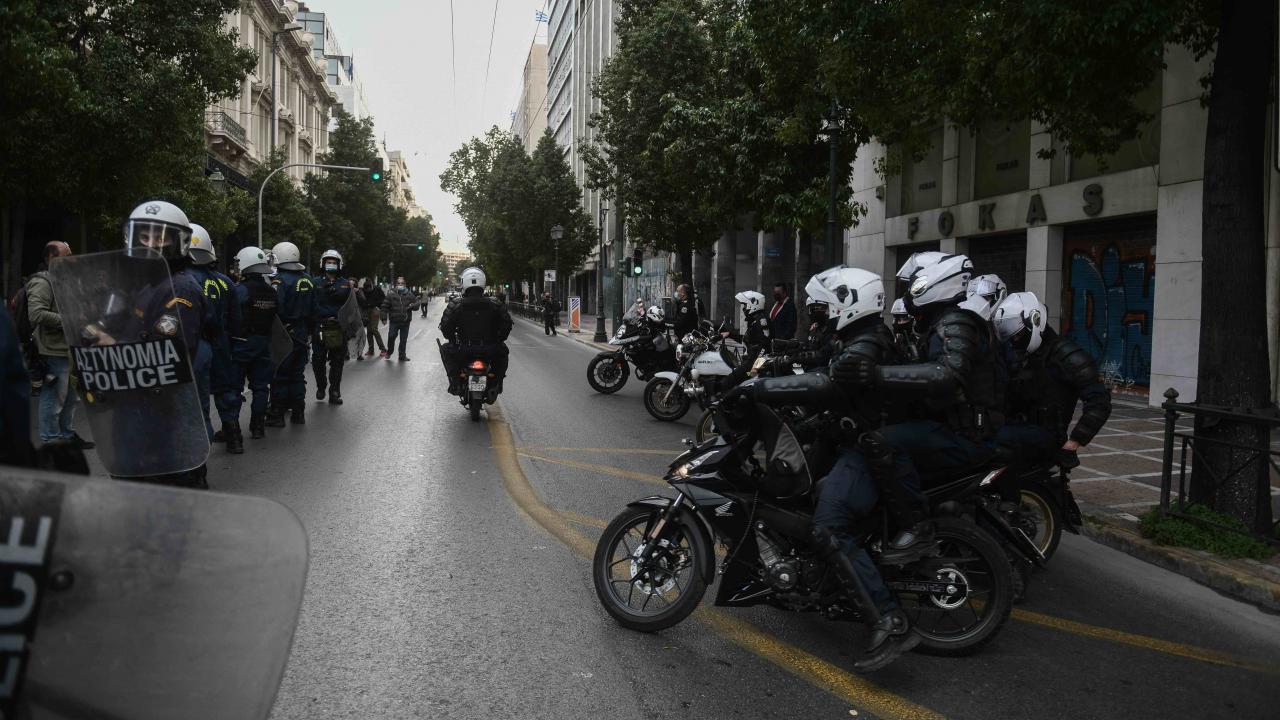The International Press Institute (IPI) today condemned the detention and intimidation of journalist Antonis Rigopoulos as he was covering a recent protest in the Greek capital Athens and called on the Interior Ministry and the Hellenic Police to ensure all officers are trained not to hinder the work of the media.
IPI, a global network of editors, media executives and leading journalists for press freedom, raised concern that, according to reports, officers repeatedly refused to acknowledge the reporter’s “press” ID when it was presented. IPI called for an internal investigation into the alleged abuse and intimidation suffered by Rigopoulos while he was held in a police station.
The detention took place at around 3 pm on November 17 when Rigopoulos, who works for the media outlets Documento and Koutipandoras.gr, was covering a rally in commemoration of the 1973 Polytechnic University student uprising against the military dictatorship.
As the journalist was documenting the arrest of protesters at the intersection of Theodore Diligiannis and Samoa streets, he was approached by traffic police officers, according to media reports and representatives from Documento who spoke to IPI.
Despite the fact that Rigopoulos was wearing a full gas mask, which he said he was using to protect against the tear gas which had earlier been fired to disperse protesters, police tried to fine him €300 under COVID-19 regulations for not wearing a surgical mask.
The officers then brought him to the headquarters of the Traffic Police where Rigopoulos claims they addressed him in a threatening and abusive manner in an attempt to provoke him. He later reported that one officer pushed him forcefully into a chair and shouted aggressively in his face.
Rigopoulos added that officers repeatedly refused to acknowledge his journalistic ID and took his national ID off him for about half an hour. Documento, which later condemned the police’s actions, reported that Rigopoulos refused to pay the fine imposed on him and was eventually released without charges.
“The unjustified detention of Antonis Rigopoulos was an unacceptable attempt to harass reporters covering the protests and a clear attack on press freedom”, IPI Deputy Director Scott Griffen said. “Sadly, this isn’t an isolated incident. In recent weeks, we’ve seen police in Greece use arbitrary detentions and threats of fines and charges to intimidate journalists covering sensitive topics.
“The Hellenic Police and the Greek Interior Ministry must take concrete action to make sure all police are trained not to hinder the work of the media as part of their domestic and international obligations in terms of freedom of expression and protection and safety of journalists.”
He added: “Ironically, this comes just as Greece signed a communique as part of the Media Freedom Coalition expressing concern about arrests of journalists and attacks on media freedom worldwide. It’s clear that the Greek government needs to put these principles and pledges into action at home first.”
The Board of Directors of the Journalists’ Union of Athens Daily Newspapers also condemned the incident and called on police not to prevent journalists from exercising their right to inform the public.
🇬🇷 Unjustified detentions, threats of fines & aggressive intimidation – all tactics against journalists used by police in #Greece in recent weeks
At a protest in #Athens, police detained & verbally harassed @tony_rgps of @documentonews & @Kouti_Pandoras https://t.co/KlOvk6xODs pic.twitter.com/OJRa9HnqVf
— IPI – The Global Network for Press Freedom (@globalfreemedia) November 18, 2020
Pattern of attacks
During the same protest in Athens another Documento journalist, Marios Aravantinos, reported that he was reporting on arrests by police one riot officer shouted at him “What are you filming?” and then hit him on the left shoulder. According to reports, he said that another pushed him with a riot shield and the other hit him in an attempt to knock the phone out of his hand.
It is the second time in a matter of weeks that IPI has denounced the Greek police’s harassment of journalists. In October, a German media crew making a film about climate-induced migration on the island of Samos were detained for seven hours under vague threats of “espionage” charges, unnecessarily strip searched and repeatedly denied access to a lawyer.
Other intentional media have also faced similar acts of obstruction from Greek police in recent months. For five days starting on September 9, journalists and photographers on the Greek island of Lesbos were intermittently restricted for no reason from reporting from an area where thousands of refugees and asylum seekers had been living on the roadside without accommodation or sanitation.
On other occasions journalists faced physical violence from police. On August 9, Turkish-Kurdish journalists Çağdaş Kaplan and Bercem Mordeniz were detained and later racially abused by police while being held without charge for around eight hours, after they had tried to report on the arrest of a man in Athens. The medical report indicated that violence used against them during their arrest.
In another incident on 15 July, police in riot gear harassed and intimidated photojournalists covering an anti-fascist demonstration in the Greek capital Athens.
This statement by IPI is part of the Media Freedom Rapid Response (MFRR), a Europe-wide mechanism which tracks, monitors and responds to violations of press and media freedom in EU Member States and Candidate Countries.

